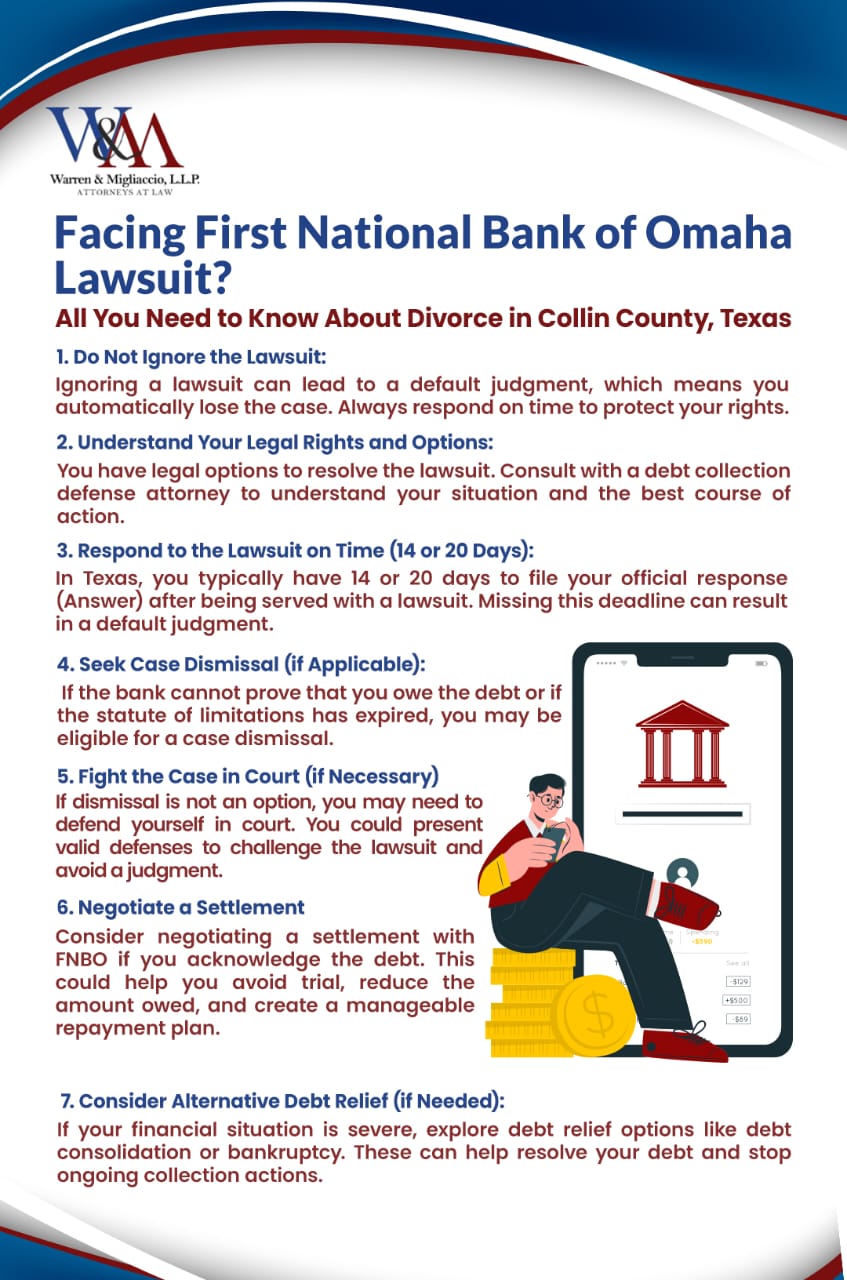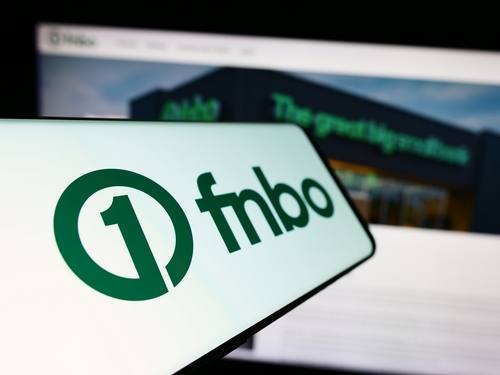Facing a lawsuit from First National Bank of Omaha can be overwhelming and confusing. After being served with lawsuit papers, you may be unsure of your rights, whether you can fight the lawsuit or negotiate, and how to move forward. If you take anything away from this article, it is never to ignore a debt collection lawsuit. You have legal options to resolve the lawsuit if you act quickly. Below, our Texas debt collection defense lawyers discuss what to know if facing a First National Bank of Omaha lawsuit.
What Is First National Bank of Omaha?
First National Bank of Omaha, also known as FNB of Omaha or FNBO, is a financial institution headquartered in Omaha, Nebraska. It has locations throughout multiple states, including Nebraska, Colorado, Iowa, Illinois, Kansas, South Dakota, Wyoming, and Texas.
Founded in 1857, FNBO is a privately owned bank and subsidiary of the larger First National Bank of Nebraska. According to its website, the bank is rooted in six generations of family leadership from the Lauritzen family.
First National Bank of Omaha offers a wide range of financial products, including:
- Credit cards
- Personal loans
- Personal lines of credit
- Auto loans
- Home loans

Why Is First National Bank of Omaha Suing Me?
First National Bank of Omaha may be suing you because it believes that you owe it a debt. Typically, a debt collection lawsuit claims that you have breached a contract, like a credit card agreement or personal loan contract, and owe a specific amount of money, which may include accrued interest and late fees. First National Bank of Omaha may file a lawsuit after other collection efforts like phone calls, letters, and emails have failed.
Generally, FNBO hands its defaulted accounts over to debt collection law firms if it decides to pursue litigation. Therefore, you will likely hear from its lawyer about a lawsuit rather than the company itself. In Texas cases, First National Bank of Omaha often uses the law firms Suttell & Hammer, P.S., and Javitch Block, LLC.
What Do I Do if Sued by First National Bank of Omaha?
Is First National Bank of Omaha suing you for debt collection? If so, the most critical takeaway we can give you is not to ignore it.
If you fail to respond to the lawsuit or appear in court, the court may issue a default judgment against you. A default judgment means you automatically lose the case, even if you do not owe the money or have strong defenses against the lawsuit.
If FNBO gets a default judgment against you, it can pursue further collection efforts to obtain the money. For example, it may seek bank garnishment, which involves freezing and seizing money from your bank accounts, property liens, or property seizure.
In Texas, you typically have 14 or 20 days from the date you were served to file your Answer to the lawsuit. Your deadline to respond depends on the court overseeing the case. In your Answer, you should generally deny each allegation FNBO has made against you and present any valid defenses you may have to the lawsuit.
We recommend consulting an experienced Texas debt defense lawyer. An attorney can help you understand your situation, legal rights, and the best course of action for your case. If you decide to work with a lawyer for your case, they will handle the Answer on your behalf. An attorney will ensure that your Answer protects your best interests and will correctly file it on time, shielding you from a default judgment.
What Are My Legal Options if Facing a FNBO Lawsuit?
The best course of action for your case will depend on the strength of FNBO’s case against you and your financial situation. We recommend consulting with a Texas debt collection defense lawyer about the claims against you. An experienced attorney can help you determine the best legal strategy for your unique situation.
Generally, however, legal options in a debt collection case include the following:
- Seek a case dismissal. Many potential defenses could lead to a case dismissal. For example, if First National Bank of Omaha cannot establish that you owe the debt, or if the statute of limitations (generally four years in Texas for debt) has expired, you may be entitled to a dismissal. Additionally, procedural errors, such as improper service of process, can lead to a dismissal.
- Fight the case in court. If case dismissal is not an option, you may have strong defenses to fight the lawsuit in court and win. Although litigating the case will prolong its resolution, it may be worth going to court, depending on your unique situation.
- Negotiate a settlement. You may choose to seek a settlement rather than go to trial if you acknowledge the debt. Many creditors, including FNBO, may agree to a settlement in order to avoid the time, costs, and uncertainties of trial. You may be able to negotiate a reduced lump-sum payment or set up a repayment plan that works for you.
- Seek alternative debt relief. If your financial situation is dire, you may consider seeking alternative debt relief options. For example, you may consider debt consolidation or filing for bankruptcy if your situation is severe. Bankruptcy immediately halts collection actions, including an ongoing debt collection lawsuit. It can also provide a path toward financial recovery through the discharge of unsecured debts or debt reorganization.

Frequently Asked Questions
Responding & Legal Consequences
What happens if I ignore a First National Bank of Omaha lawsuit?
If you ignore a lawsuit from First National Bank of Omaha, the court may issue a default judgment against you, automatically making you liable for the debt—even if you have valid defenses.
Once a default judgment is granted, FNBO (or its judgment creditor attorneys) can pursue garnishment, property liens, or other collection strategies.
Ignoring the lawsuit also means losing the chance to argue improper service, lack of required documentation, or other defenses.
Acting promptly can help protect your credit score and open the door to negotiation or other legal remedies.
Can First National Bank of Omaha garnish my bank account after a default judgment?
Yes. If a court grants FNBO a default or final judgment, they may legally garnish certain bank accounts or place liens on your property, depending on the rules in your state.
Judgment Execution: Once FNBO has a judgment, they can request court approval to seize funds in your accounts.
State Variations: States differ on garnishment limits and exemptions for certain types of funds.
Prompt Action: Respond to lawsuits in a timely manner to avoid unexpected bank freezes or forced payments.
How long do I have to respond to a lawsuit from First National Bank of Omaha?
In Texas, you typically have 14 or 20 days from being served to file an official Answer, based on the court’s rules. Missing this deadline can result in an automatic loss through default judgment.
Check Court Documents: Your summons or citation states the exact number of days you have to respond.
Consequences of Delay: Late filings can compromise your defense, making garnishment or collection activities more likely.
Legal Assistance: An attorney can ensure your Answer is filed on time and includes the strongest possible defenses.
Negotiation & Credit Impact
Can I negotiate a debt settlement with First National Bank of Omaha?
Yes. FNBO and many other creditors often accept reduced lump-sum payments or structured repayment plans, especially when litigation is ongoing.
Settlement Benefits: Negotiating can potentially lower the outstanding balance and avoid a court judgment on your record.
Documentation: Always secure a written debt settlement letter outlining the terms to avoid misunderstandings later.
Professional Guidance: An attorney or reputable debt settlement services provider can help you negotiate and ensure fairness in the process.
Will a First National Bank of Omaha lawsuit affect my credit score?
Yes. Lawsuits over unpaid debts, especially if they result in judgments or show delinquent payment history, can have a negative impact on your credit score and remain on your report for years.
Court Judgments: Some credit bureaus still report judgments in public record sections, which can harm your credit rating.
Payment History: Late or missed payments decrease your score, causing adverse effects when seeking future credit.
Minimizing Damage: Filing a timely defense, negotiating a settlement, or dismissing the case may mitigate long-term credit repercussions.
Common Defenses
What defenses can I raise against a First National Bank of Omaha lawsuit?
Potential defenses include disputing the debt amount, challenging sufficient documentation, pointing out improper service, or arguing that the statute of limitations has expired.
Lack of Proof: If FNBO cannot verify your account information or confirm the exact debt owed, the court may dismiss the claim.
Procedural Errors: Mistakes in serving court documents or missing required documentation could invalidate the lawsuit.
Statute of Limitations: In Texas, creditors generally have four years to file a lawsuit for unpaid debts. Beyond that, you may request a dismissal.
Consumer Protection Laws: Consumer Financial Protection Bureau regulations and the Consumer Protection Act prohibit illegal practices, offering potential grounds for defense if wrongdoing is involved.
Schedule a Free Consultation With Warren & Migliaccio Today
Are you facing a debt collection lawsuit from First National Bank of Omaha? If so, do not forget that you have legal options to resolve it. However, it is critical to act quickly to avoid a default judgment.
Warren & Migliaccio represents and defends individuals and families facing debt collection lawsuits statewide. Our Texas debt collection defense lawyers provide a free consultation to review the claims against you and help you understand your best options for moving forward. Call our law firm at (888) 584-9614 or fill out our online contact form, and we will contact you soon.

